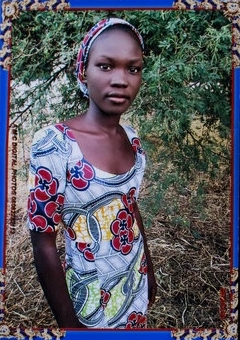Art & Exhibitions
Artist’s Photos Put Face to Missing Nigerian Schoolgirls
Glenna Gordon photographed the kidnapped girls' belongings.

Glenna Gordon photographed the kidnapped girls' belongings.

Sarah Cascone


Glenna Gordon. Kidnapped Chibok girls Rifkatu Ngalang (left) and Hauwa Mutah. Photos courtesy of their families.
Photographer Glenna Gordon has catalogued the belongings of some of the Nigerian schoolgirls kidnapped by Boku Haram extremists in April, reports the New York Times. The isolated clothing, school books, and accessories reveal the individual girls’ personalities, interests, hopes, and dreams while stressing that the girls are missing.
Gordon has been working in Africa since 2006, specifically with young women in northern Nigerian, and had previously attended and photographed protests in Lago and Abuja about the missing girls, but felt that story deserved a more personal touch.

Glenna Gordon. A dress belonging to Hajara Isa, one of the kidnapped girls.
“I kept thinking about how these girls are missing and how they’re missing from our pictures of the protests,” she told the Times. “I felt the girls were getting lost.”
Though the girls were out of reach, Gordon realized she could get in touch with their families and learn more about the teenagers through the possessions they had left behind. Through her work, a picture of each girl is revealed, from a love of hide-and-go-seek for fourth grader Elizabeth Joseph, to a letter from Hauwa Ntaki wishing her brother “a thousand greetings to his friends and none to his enemies.”

Glenna Gordon. A notebook belonging to 18-year-old Hauwa Ntaki, third in her class, who loves volleyball and hopes to be a nurse or economist.
Because there are rumors that Boku Haram is planning to attack the girls’ home of Chibok, military blockades prevented Gordon from personally visiting the village. Instead, she interviewed their parents and relatives by phone, and had some of their belongings sent to Abuja via a two-part journey by bush taxi and by bus.
Each item, Gordon found, revealed subtle details about their owner’s lives. Three blue gingham cotton uniforms, each handmade, were slightly different. One showed numerous signs of repair, suggesting it had been passed down from an older sibling, or that her family simply couldn’t afford to replace it. Another was still dirty, perhaps indicating that the girl didn’t have money for soap to wash it.

Glenna Gordon. School uniforms belonging to three of the kidnapped Chibok girls.
Other attempts to put a face to the missing girls have proved less than successful. The #BringBackOurGirls Twitter campaign, aimed at raising awareness of the plight of the kidnapped school children, has attracted criticism for it appropriation of photos of unrelated girls from Guinea-Bissea taken by Ami Vitale and used without her permission.
“It’s a beautiful campaign that shows the power of social media,” Vitale told the Times, explaining that she is disturbed by how her photos have been misrepresented. “Can you imagine having your daughter’s image spread throughout the world as the face of sexual trafficking? These girls have never been abducted, never been sexually trafficked.”

Glenna Gordon. A notebook belonging to Dourcas Yakubu, described by her parents as a shy 16-year-old. In the diary, she wrote about exchanging romantic notes with a boy.

Glenna Gordon. Shoes belonging to 18-year-old pastor’s daughter Monica Enoch, who loves singing. She and a close friend, Saratu Emmanuel, who moved in with the Enochs after escaping a Boku Haram attack in nearby Gambaru but losing her family, were both kidnapped by the terrorist group.